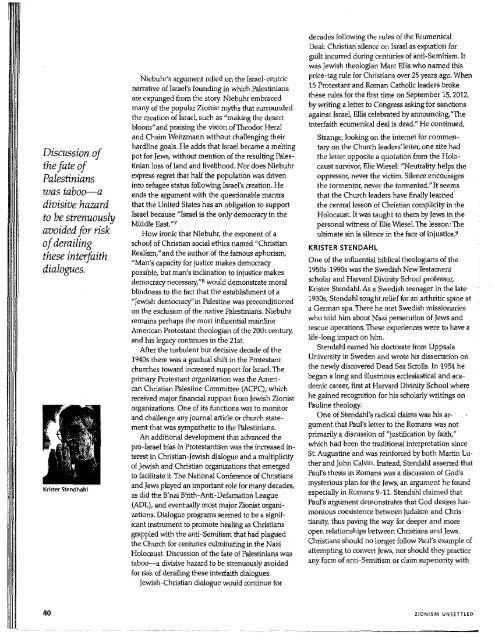zionism_unsettled_scan
zionism_unsettled_scan
zionism_unsettled_scan
Create successful ePaper yourself
Turn your PDF publications into a flip-book with our unique Google optimized e-Paper software.
I<br />
Discussion of<br />
the fate of<br />
Palestinians<br />
was taboo--a<br />
divisive hazard<br />
to be strenuously<br />
avoided for risk<br />
of derailing<br />
these interfaith<br />
dialogues.<br />
Krister Stendhahl<br />
Niebuhr's argument relied on the Israel-centric<br />
narrative of Israel's founding in which Palestinians<br />
are expunged from the story. Niebuhr embraced<br />
many of the popular Zionist myths that surrounded<br />
the creation of Israel, such as "making the desert<br />
bloom" and praising the vision of Thea dar Herzl<br />
and Chaim Weitzmann without challenging their<br />
hardline goals. He adds that Israel became a melting<br />
pot for jews, without mention of the resulting Palestinian<br />
loss of land and livelihood. Nor does Niebuhr<br />
express regret that half the population was driven<br />
into refugee status following Israel's creation. He<br />
ends the argument with the questionable mantra<br />
that the United States has an obligation to support<br />
Israel because "Israel is the only democracy in the<br />
Middle East. "7<br />
How ironic that Niebuhr, the exponent of a<br />
school of Christian social ethics named "Christian<br />
Realism," and the author of the famous aphorism,<br />
"Man's capacity for justice makes democracy<br />
possible, but man's inclination to injustice makes<br />
democracy necessary/'s would demonstrate moral<br />
blindness to the fact that the establishment of a<br />
"Jewish democracy"in Palestine was preconditioned<br />
on the exclusion of the native Palestinians. Niebuhr<br />
remains perhaps the most influential mainline<br />
American Protestant theologian of the 20th century,<br />
and his legacy continues in the 21st.<br />
After the turbulent but decisive decade of the<br />
1940s there was a gradual shift in the Protestant<br />
churches toward increased support for Israel. The<br />
primal)' Protestant .organization was the American<br />
Christian Palestine Committee (ACPC), which<br />
received major financial support from jewish Zionist<br />
organizations. One of its functions was to monitor<br />
and challenge any journal article or church statement<br />
that was sympathetic to the Palestinians.<br />
An additional development that advanced the<br />
pro-Israel bias in Protestantism was the increased interest<br />
in Christian-jewish dialogue and a multiplicity<br />
of jewish and Christian organizations that emerged<br />
to facilitate it. The National Conference of Christians<br />
and jews played an important role for many decades,<br />
as did the B'nai B'rith-Anti-Defamation League<br />
(ADL), and eventually most major Zionist organizations.<br />
Dialogue programs seemed to be a significant<br />
instrument to promote healing as Christians<br />
grappled with the anti-Semitism that had plagued<br />
the Church for centuries culminating in the Nazi<br />
Holocaust. Discussion of the fate of Palestinians was<br />
taboo-a divisive hazard to be strenuously avoided<br />
for risk of derailing these interfaith dialogues.<br />
Jewish-Christian dialogue would continue for<br />
decades following the rules of the Ecumenical<br />
Deal: Christian silence on Israel as expiation for<br />
guilt incurred during centuries of anti-Semitism. It<br />
was Jewish theologian Marc Ellis who named this<br />
price-tag rule for Christians over 25 years ago. When<br />
15 Protestant and Roman Catholic leaders broke<br />
these rules for the first time on September 15, 2012,<br />
by writing a letter to Congress asking for sanctions<br />
against Israel, Ellis celebrated byannouncing,"The<br />
interfaith ecumenical deal is dead./I He continued,<br />
Strange, looking on the internet for commentary<br />
on the Church leaders'letter, one site had<br />
the letter opposite a quotation from the Holocaust<br />
survivor, Elie Wiesel: "Neutrality helps the<br />
oppressor, never the victim. Silence encourages<br />
the tormentor, never the tormented."lt seems<br />
that the Church leaders have finally learned'<br />
the central lesson of Christian complicity in the<br />
Holocaust. It was taught to them by jews in the<br />
personal witness of Elie WieseL The lesson: The<br />
ultimate sin is silence in the face of injustice. 9<br />
KRISTER STENDAHL<br />
One of the influential biblical theologians of the<br />
1950s-.1990s was the Swedish NewTestament<br />
scholar and Harvard Divinity School professor,<br />
Krister Stendahl. AJ3 a Swedish teenager in the late<br />
1930s, Stendahl sought relief for an arthritic spine at<br />
a German spa. There he met Swedish missionaries<br />
who told him about Nazi persecution of jews and<br />
rescue operations. These experiences were to have a<br />
life-long impact on him.<br />
Stendahl earned his doctorate from Uppsala<br />
University in Sweden and wrote his dissertation on<br />
the newly discovered Dead Sea Scrolls. In 1954 he<br />
began a long and illustrious ecclesiastical and academic<br />
career, first at Harvard Divinity School where<br />
he gained recognition for his scholarly writings on<br />
Pauline theology.<br />
One of Stendahl's radical claims was his argument<br />
that Paul's letter to the Romans was not<br />
primarily a discussion of "justification by faith,"<br />
which had been the traditional interpretation since<br />
St. Augustine and was reinforced by both Martin Luther<br />
and john Calvin. Instead, Stendahl asserted that<br />
Paul's thesis in Romans was a discussion of God's<br />
mysterious plan for the jews, an argument he found<br />
especially in Romans 9-11. Stendahl claimed that<br />
Paul's argument demonstrates that God desires harmonious<br />
coexistence between Judaism and Christianity,<br />
thus paving the way for deeper and more<br />
open relationships between Christians and Jews.<br />
Christians should no longer follow Paul's example of<br />
attempting to convert Jews, nor should they practice<br />
any form of anti-Semitism or claim superiority with<br />
40<br />
ZIONISM UNSETTLED


